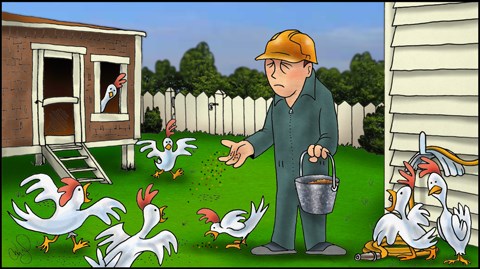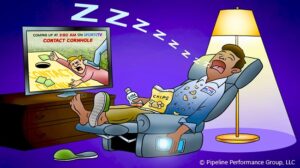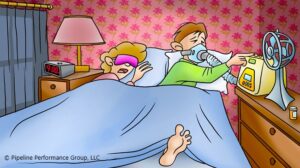Off Duty Chores
I met a gas plant operator a few years ago. The plant was in a remote area, so the operators had long commutes after their twelve-hour shifts. This operator had to drive over an hour each way. When I asked the operator if he was able to get eight hours of sleep between shifts, he replied, “No, man, I have to feed the chickens.”
While I laughed, I was reminded that many shiftworkers might have chores waiting for them once they get home. One of my uncles was a farmer and a carpenter who worked long days, then did his farming chores late into the night. I know another controller after working night shift who would take care of his children in the daytime so his spouse could go to work. I don’t think the operator feeding chickens, or my uncle tending the farm, or the controller caring for the children got adequate sleep.
Do you have daily chores that have to be done whether you have worked a shift or not? Are those chores unavoidable and are you the only one who can perform them? Others may not have chores, but may choose other activities besides sleep and rest.
Whether through chores or choices, shiftworkers may not get adequate sleep even if their companies are meeting this CRM rule requirement:
- Establish shift lengths and schedule rotations that provide controllers off-duty time sufficient to achieve eight hours of continuous sleep.
Managing the risks of fatigue is a shared responsibility. The employer should provide the opportunity for eight hours of sleep, have adequate staffing so that employees do not have to work overtime on their days off, and avoid calling the employee when he or she may be asleep.
The employee should:
- Use off-duty time between shifts to get as much sleep as possible,
- Live a reasonable commute time from the work place, and
- Schedule personal activities on off days, not between shifts.
If daily chores are unavoidable, get them done as quickly as possible. Get in bed as soon as possible after getting home and turn your devices off so that you will not be tempted by those distractions. Take your responsibilities for fatigue mitigation seriously. The purpose of the fatigue mitigation section of the CRM rule is to reduce the risk associated with controller fatigue that could inhibit a controller’s ability to carry out the roles and responsibilities.
Napping in the News
What is the napping policy in your control room? The Wall Street Journal (July 15, 2017) reported that Hunter Harrison, the new CEO of CSX Railroad, has ended the two decades policy of allowing up to a 45-minute nap during shift with strict protocols.
Several US railroads do allow naps. The CEO of Union Pacific is quoted, “We think it’s pertinent and appropriate in certain circumstances to enable an employee to nap.” A CSX spokesman takes a different viewpoint, “Employees are safer when they are fully engaged in the activity around them at all times when they are on duty.” The article points out that train crews may spend time on duty just sitting and waiting, and have time for naps and other personal activities.
My observations in most pipeline control rooms lead me to believe that napping at the console should not be allowed. Napping could lead to a delayed or incorrect response if something occurred. If the company chose to allow napping, then it should have enough trained and qualified controllers to allow a break from the console and the controller could go to a nap room for a predetermined amount of time.
My observations in most pipeline control rooms lead me to know that napping occurs at consoles whether it is allowed or not. That is partially due to controllers not using off duty time to sleep and rest.




